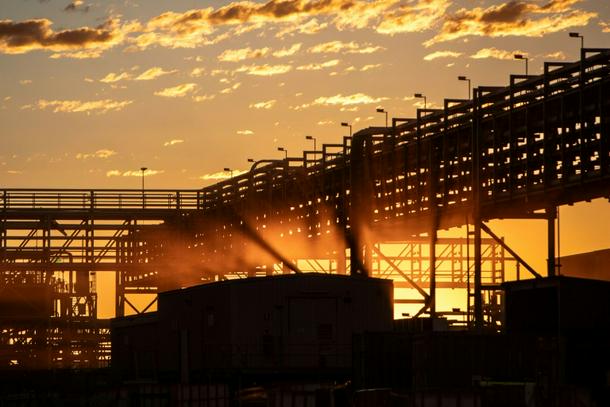
A rare earths mine in Mount Weld in Western Australia
Toronto (Canada) (AFP) - G7 energy ministers meeting in Canada on Thursday planned to launch a new alliance to counter China’s critical mineral dominance, in a push for more reliable access to the resources that power advanced technologies.
The two-day Group of Seven meeting in Toronto opened hours after US President Donald Trump and Chinese counterpart Xi Jinping signed an extendable one-year deal on China’s supply of rare earths.
Germany’s Minister for Economic Affairs and Energy, Katherina Reiche, told reporters the Trump-Xi deal marked “a good sign,” noting German reliance on Chinese critical mineral exports.
But she stressed the agreement “can’t prevent us” from moving forward on broadening supply chains for the materials used in everything from solar panels and mobile phones to precision missiles.
“We need diversification of our import routes on raw materials,” Reiche said.
- Production alliance -
With concern growing about China’s overwhelming dominance in rare earth refining and processing, G7 leaders announced a “Critical Minerals Action Plan” at a summit in western Canada in June.
Canada’s Energy Minister Tim Hodgson said the Toronto meeting will aim to formally launch a new initiative designed to curb China’s market influence.
The Critical Minerals Production Alliance will “secure transparent, democratic, and sustainable critical mineral supply chains across the G7,” he said.
Under the alliance, the governments of Britain, Canada, France, Germany, Italy, Japan, and the United States would mobilize private investment to expand critical mineral production that bypasses China.
The head of the critical minerals division at the International Energy Agency, Tae-Yoon Kim, told AFP the Toronto meeting offers “a major opportunity… to start shifting market power.”
“The high concentration of critical minerals refining in a single country creates economic and national security risks,” Kim said in an email ahead of the G7 talks.
- Distorted markets -
A central complaint about China’s conduct is that it does not adhere to market principles.
Since a high proportion of material moves through Chinese-controlled businesses, Beijing can build stockpiles and control global supply.
“For decades, we’ve been facing a competitor who has very consistently distorted free markets, used industrial subsidies, created overcapacity, and undermined fair trade,” said Abigail Hunter, executive director of the Washington-based Center for Critical Minerals Strategy.
Hunter noted that within the G7 there are contrasting energy policy priorities.
The Trump administration, in particular, is seen as less concerned about the transition to clean energy.
G7 unity on critical minerals may also be undermined by Trump’s protectionist trade policies, which have caused global economic upheaval.
But given G7 alignment on “security of supply,” Hunter said she saw space for cooperation.
“I’m an optimist. I have to be, because this sector is very painful at times.”
For her, progress at the Toronto meeting would include concrete action on the issue of traceability – tracking raw materials from mining to refinement and ensuring suppliers follow global market rules.
Hunter said that “opaque” Chinese-controlled companies exist across the supply chain, which the G7 should strive to “box out of the market” with new policies on traceability and transparency.
“I’m really interested to see what they do on that,” she said, adding that processing still includes a “spider web of entities” where Chinese officials maintain outsized control.
“We have a short window of opportunity to fix this. The window is still open – it’s just very, very small,” Hunter said.